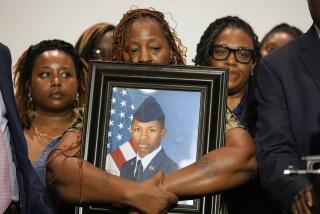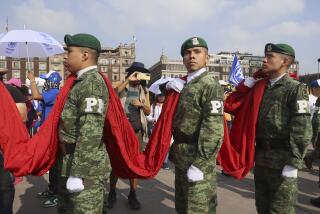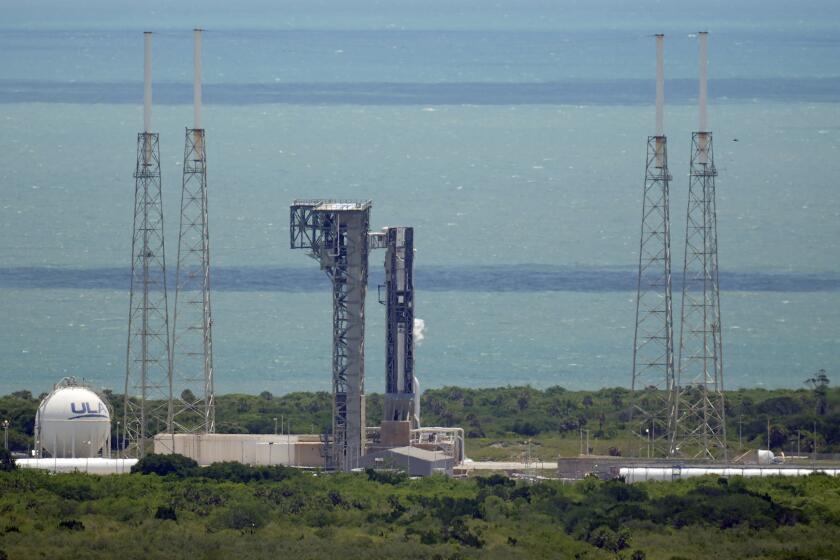Both Sides Defy Bosnia ‘No-Fly’ Rules : Balkans: Despite allied patrols, Serb and Muslim craft go up with impunity. None is shot down.
Serbian and Muslim helicopters have violated the United Nations’ “no-fly” zone over Bosnia-Herzegovina with impunity in the last two months despite continual patrolling by NATO fighters, U.N. documents show.
Not a single violator has been shot down by the North Atlantic Treaty Organization enforcers, who have hardly tried to do anything about the violations.
In only one case, sources said, have NATO fighters requested U.N. permission to shoot down an aircraft on an unauthorized flight. The permission was reportedly refused by Lt. Gen. Lars-Eric Wahlgren of Sweden, commander of U.N. forces in the area until the end of June. The offending aircraft belonged to the Muslims.
The lack of enforcement by the U.S.-European operation has given ammunition to critics who accused the Security Council of passing the no-fly resolution on Bosnia only to quiet public opinion at home rather than influence the course of events in the Balkans.
Since the Security Council, under pressure from the United States, passed the resolution on March 31 authorizing NATO to enforce the no-fly zone, Secretary General Boutros Boutros-Ghali has reported more than 140 violations, mostly by helicopters.
The average of a little under 50 violations a month is considerably less than the 80 a month recorded before the enforcement resolution was passed. But the pace has been increasing. In the week ending last Saturday, for example, there were 16 violations, just a little under the old pace.
Some military sources, trying to explain the enforcement record, talk about the difficulty of fighters hunting and targeting helicopters. Others point out that most of the offending copters in this area carry Red Cross markings; these are surely fake, they say, but allied pilots do not like to take the risk of possibly shooting down a medical flight.
The main problem, though, appears to be a fear that shooting down a helicopter would turn a belligerent against the U.N. peacekeeping operation and force the United Nations to withdraw from its program of providing humanitarian aid throughout the war-ravaged area.
“The United Nations are hostages,” says Venezuela’s U.N. ambassador, Diego Arria. “The U.N. is afraid to do anything because it fears retaliation against its peacekeepers.”
The United Nations set up the no-fly zone last October but did not provide any enforcement at first. By March, the secretary general had reported 465 violations, including two instances where small Serb planes had bombed Muslim villages.
Under American pressure, the Security Council, by a 14-0 vote with China abstaining, decided on March 31 to enforce the zone, providing for the shooting down of all unauthorized airplane and helicopter flights over Bosnia. The resolution was aimed at Serb aggressors.
Wahlgren had opposed the resolution, telling council members that any Serb retaliation would cripple the U.N. humanitarian operation. To assuage his fears, the council provided that no plane or copter would be attacked without U.N. approval.
NATO has provided 78 fighters, 10 refueling tankers and eight AWACS high-technology surveillance planes from France, Britain, the Netherlands, Turkey and the United States for the enforcement operation. The fighters have flown more than 2,600 sorties since the operation began in April.
At first, there was a lull in the flights. But, as the Serbs realized that NATO fighters would only harass them but not shoot them down, they began to fly their helicopters more brazenly. Forces of the Muslim-led government of Bosnia began to violate the zone, as well, sometimes more often than the Serbs. The last six unauthorized flights reported to the council involved Bosnian government copters flying last weekend.
Since enforcement of the no-fly zone began, none of the unauthorized flights has been bombing runs. Instead, the flights have transported passengers, presumably troops, often by helicopters with Red Cross markings or by medical evacuation planes with more healthy passengers than sick ones.
Times staff writer Art Pine, in Washington, contributed to this report.
More to Read
More to Read
More to Read
Start your day right
Sign up for Essential California for news, features and recommendations from the L.A. Times and beyond in your inbox six days a week.
You may occasionally receive promotional content from the Los Angeles Times.






